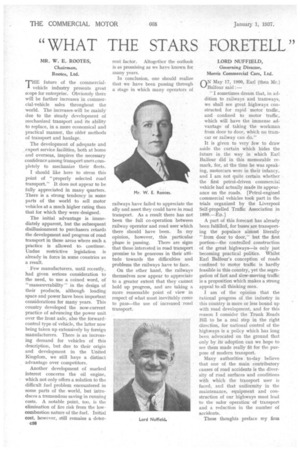"WHAT THE STARS FORETELL
Page 88

If you've noticed an error in this article please click here to report it so we can fix it.
MR. W. E. ROOTES, Chairman, Rootes, Ltd.
THE future of the commercial1 vehicle industry presents great scope for enterprise. Obviously there will be further increases in commercial-vehicle sales throughout the world. The increases will be mainly due to the steady development of mechanized transport and its ability to replace, in a more economical and practical manner, the older methods of transport and haulage.
The development of adequate and expert service facilities, both at home and overseas, inspires the necessary confidence among transport users completely to mechanize their fleets.
I should like here to stress this point of "properly selected road transport." It does not appear to be fully appreciated in many quarters. There is a strong tendency in some parts of the world to sell motor vehicles at a much higher rating than that for which they were designed.
The initial advantage is immediately apparent, but the subsequent disillusionment to purchasers retards the development and progress of road transport in those areas where such a practice is allowed to. continue. Undue restrictive legislation is already in force in some countries as a result.
Few manufacturers, until recently, had given serious consideration to the need, to use a coined word, of " manceuvrability " in the design of their products, although loading space and power have been important considerations for many years. This country developed the now-current practice of advancing the power unit over the front axle, also the forwardcontrol type of vehicle, the latter now being taken up extensively by foreign manufacturers. There is an increasing demand for vehicles of this description, but due to their origin and development in the United Kingdom, we still haye a distinct advantage over competitors.
Another development of marked interest concerns the oil engine, which not only offers a solution to the difficult fuel problem encountered in some parts of the world, but introduces a tremendous saving in running costs. A notable point, too, is the elimination of fire risk from the lowcombustion nature of the fuel. Initial cost, however, still remains a deter c38 rent factor. Altogether the outlook is as promising as we have known for many years.
In conclusion, one should realize that we have been passing through a stage in which many operators of railways have failed to appreciate the ally and asset they could have in road transport. As a result there has not been the full co-operation between railway operator and road user which there should have been. In my opinion, however, this particular phase is passing. There are signs that those interested in road transport promise to be generous in their attitude towards the difficulties and problems the railways have to face.
On the other hand, the railways themselves now appear to appreciate to a greater extent that they cannot hold up progress, and are taking a more reasonable point of view in respect of what must inevitably come to pass—the use of increased road transport.
LORD NUFFIELD, Governing Director, Morris Commercial Cars, Ltd.
ro May 17, 1900, Earl (then Mr.) '—'Balfour said :— "I sometimes dream that, in addition to railways and tramways, we shall see great highways constructed for rapid motor traffic, and confined to motor traffic, which will have the immense advantage of taking the workman from door to door, which no tramcar or railway can do."
It is given to very few to draw aside the curtain which hides the future in the way in which Earl Balfour did in this memorable remark, for, at the time he was speaking, motorcars were in their infancy, and I am not quite certain whether the first petrol-driven commercial vehicle had actually made its appearance on the roads. [Petrol-engined commercial vehicles took part in the trials organized by the Liverpool Self-propelled Traffic Association in 1899. En.] A part of this forecast has already been fulfilled, for buses are transporting the populace almost literally " from door to door," but the first portion—the controlled construction of the great highways—is only just becoming practical politics. Whilst Earl Balfour's conception of roads confined to motor traffic is hardly feasible in this country, yet the segregation of fast and slow-moving traffic is a proposition which makes a strong appeal to all thinking men.
I am of the opinion that the ratienal progress of the industry in this country is more or less bound up with road development, and for this reason I consider the Trunk Roads Bill to be a real step in the right direction, for national control of the highways is a policy which has long been advocated on the ground that only by its adoption can we hope to see them made really fit for the purpose of modern transport.
Many authorities to-day believe that one of the main contributory causes of road accidents is the diversity of road surfaces and conditions with which the transport user is faced, and that uniformity in the maintenance, equipment and construction of our highways must lead to the safer operation of transport and a reduction in the number of accidents.
These thoughts preface my firm




























































































































































